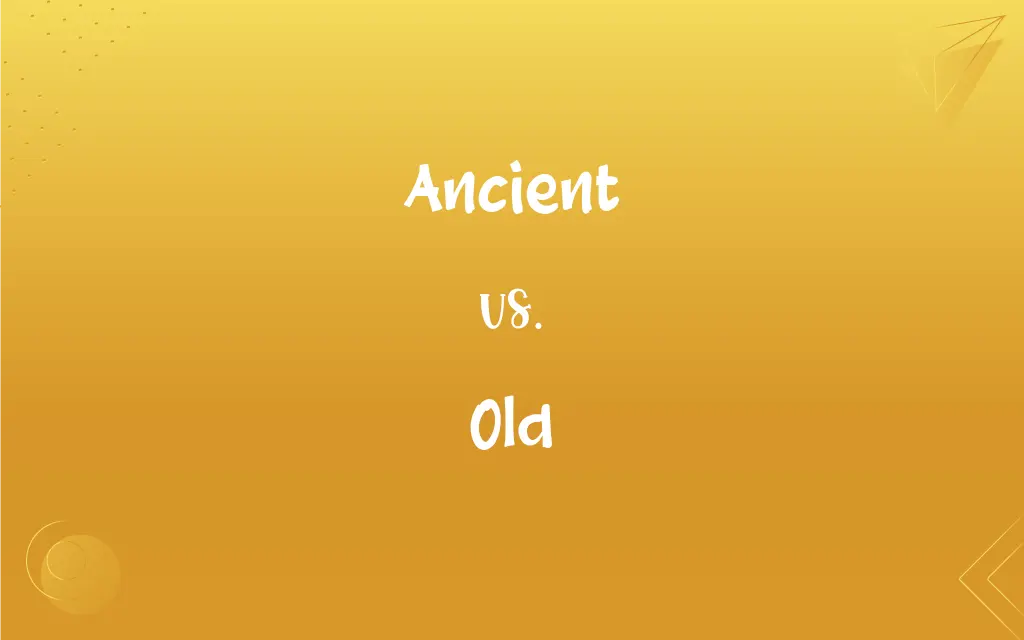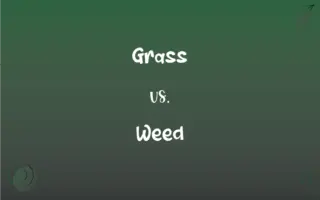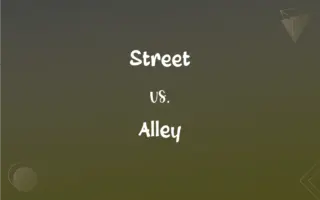Ancient vs. Old: What's the Difference?
Edited by Harlon Moss || By Janet White || Updated on September 29, 2023
Ancient refers to times long past, often millennia ago, while old denotes something having existed or lived for a significant amount of time, typically years or decades.

Key Differences
The term "ancient" is generally used to describe periods and objects from long, long ago, often thousands of years in the past. It is a term closely associated with early human civilizations, antiquities, and olden cultures and their contributions to history, such as the Ancient Egyptians or the Ancient Greeks. The word ancient implies a profound historical significance and often a sense of mystery and awe, encompassing the origin of societies, development of cultures, and ancient innovations.
Conversely, "old" is a relative term used to describe something that has existed for a considerable amount of time but doesn’t necessarily have historical significance. An old object or individual may be aged, worn, or outdated, possibly encompassing a few decades or centuries. The usage of old is broad and can be applied to people, objects, ideas, or places, expressing a comparison to something newer or younger. It doesn’t possess the same historical depth or implication as ancient.
Ancient, being associated with long-gone civilizations and eras, typically refers to items, structures, or ideas from times that preceded recorded history or from the early ages of recorded history. It denotes periods and cultures that have had a lasting impact on humanity and its progress, contributing to our understanding of human development, society formations, and early advancements. It often brings to mind artifacts, ruins, and historical documents that are studied to glean insights into our predecessors.
Old, however, is much more subjective and less historically anchored. It is a term used more in the context of the lifespan of living beings or the existence of inanimate objects. An old tree may be a few centuries old, an old book may be a few decades old, and an old man may be in his eighties or nineties. The term old doesn’t automatically imply historical importance or significance but rather denotes the passage of time and its effects on living and non-living entities.
While ancient implies a rich tapestry of historical contexts and significant remnants of bygone eras, old merely serves as a descriptor of age, often highlighting the contrast between the past and the present, the new and the worn, the fresh and the decayed. Appreciating the nuanced difference between ancient and old is essential to accurately interpreting and conveying the age and significance of the subject matter.
ADVERTISEMENT
Comparison Chart
Timeframe
Often millennia ago.
Typically years or decades.
Historical Significance
Usually has profound historical significance.
Doesn’t necessarily have historical significance.
Context
Refers to civilizations, cultures, and eras.
Applies to people, objects, ideas, or places.
Relativity
More absolute in representing long past times.
More relative and subjective.
Usage
Specific to historical and archeological contexts.
Broad and general usage.
ADVERTISEMENT
Ancient and Old Definitions
Ancient
Belonging to the very distant past.
The ancient ruins attract many tourists annually.
Old
No longer young.
My old dog still loves to play fetch.
Ancient
Having been in existence for a very long time.
The ancient tree has stood here for centuries.
Old
Possessed or used for a long time.
He wore his old hat every day.
Ancient
No longer in existence.
The ancient civilization left behind mysterious structures.
Old
Outdated or obsolete.
We need to replace the old equipment.
Ancient
Of, relating to, or belonging to times long past, especially before the fall of the Western Roman Empire (AD 476)
Ancient cultures.
Old
Former or previous.
She visited her old school.
Ancient
Of great age; very old
"The males live up to six months—positively ancient, for a bee" (Elizabeth Royte).
Old
Having lived or existed for a relatively long time; far advanced in years or life.
Ancient
(Archaic) Having the qualities associated with age, wisdom, or long use; venerable
"You seem a sober, ancient Gentleman by your habit" (Shakespeare).
Old
Relatively advanced in age
Pamela is our oldest child.
Ancient
A very old person.
Old
Made long ago; in existence for many years
An old book.
Ancient
A person who lived in times long past.
Old
Of or relating to a long life or to people who have had long lives
A ripe old age.
Ancient
The peoples of the classical nations of antiquity.
Old
Having or exhibiting the physical characteristics of age
A prematurely old face.
Ancient
The ancient Greek and Roman authors.
Old
Having or exhibiting the wisdom of age; mature
A child who is old for his years.
Ancient
(Archaic) An ensign; a flag.
Old
Having lived or existed for a specified length of time
She was 12 years old.
Ancient
(Obsolete) A flag-bearer or lieutenant.
Old
Exhibiting the effects of time or long use; worn
An old coat.
Ancient
Having lasted from a remote period; having been of long duration; of great age, very old.
An ancient city
An ancient forest
Old
Known through long acquaintance; long familiar
An old friend.
Ancient
Existent or occurring in time long past, usually in remote ages; belonging to or associated with antiquity; old, as opposed to modern.
An ancient author
An ancient empire
Old
Skilled or able through long experience; practiced
He is an old hand at doing home repairs.
Ancient
(history) Relating to antiquity as a primarily European historical period; the time before the Middle Ages.
Old
Belonging to a remote or former period in history; ancient
Old fossils.
Ancient
(obsolete) Experienced; versed.
Old
Belonging to or being of an earlier time
Her old classmates.
Ancient
(obsolete) Former; sometime.
Old
Often Old Being the earlier or earliest of two or more related objects, stages, versions, or periods.
Ancient
A person who is very old.
Old
Having become slower in flow and less vigorous in action. Used of a river.
Ancient
A person who lived in ancient times.
Old
Having become simpler in form and of lower relief. Used of a landform.
Ancient
One of the senior members of the Inns of Court or of Chancery.
Old
Used as an intensive
Come back any old time. Don't give me any ol' excuse.
Ancient
(obsolete) A senior; an elder; a predecessor.
Old
Used to express affection or familiarity
Good ol' Sam.
Ancient
A flag, banner, standard or ensign.
Old
An individual of a specified age
A five-year-old.
Ancient
The bearer of a flag; ensign
Old
Old people considered as a group. Used with the
Caring for the old.
Ancient
Old; that happened or existed in former times, usually at a great distance of time; belonging to times long past; specifically applied to the times before the fall of the Roman empire; - opposed to modern; as, ancient authors, literature, history; ancient days.
Witness those ancient empires of the earth.
Gildas Albanius . . . much ancienter than his namesake surnamed the Wise.
Old
Former times; yore
In days of old.
Ancient
Old; that has been of long duration; of long standing; of great age; as, an ancient forest; an ancient castle.
Remove not the ancient landmarks, which thy fathers have set.
An ancient man, strangely habited, asked for quarters.
Old
Of an object, concept, relationship, etc., having existed for a relatively long period of time.
An old abandoned building
An old friend
Ancient
Known for a long time, or from early times; - opposed to recent or new; as, the ancient continent.
A friend, perhaps, or an ancient acquaintance.
Old
Of a living being, having lived for most of the expected years.
A wrinkled old man
Ancient
Dignified, like an aged man; magisterial; venerable.
He wrought but some few hours of the day, and then would he seem very grave and ancient.
Old
Of a perishable item, having existed for most of, or more than, its shelf life.
An old loaf of bread
Ancient
Experienced; versed.
Though [he] was the youngest brother, yet he was the most ancient in the business of the realm.
Old
Of a species or language, belonging to a lineage that is distantly related others
The ginkgo is one of the oldest living trees
Basque is the oldest language in Europe
Ancient
Former; sometime.
They mourned their ancient leader lost.
Old
Having been used and thus no longer new or unused.
I find that an old toothbrush is good to clean the keyboard with.
Ancient
Those who lived in former ages, as opposed to the moderns.
Old
Having existed or lived for the specified time.
How old are they? She’s five years old and he's seven. We also have a young teen and a two-year-old child.
My great-grandfather lived to be a hundred and one years old.
Ancient
An aged man; a patriarch. Hence: A governor; a ruler; a person of influence.
The Lord will enter into judgment with the ancients of his people, and the princes thereof.
Old
(heading) Of an earlier time.
Ancient
A senior; an elder; a predecessor.
Junius and Andronicus . . . in Christianity . . . were his ancients.
Old
Former, previous.
My new car is not as good as my old one.
A school reunion for Old Etonians
Ancient
One of the senior members of the Inns of Court or of Chancery.
Old
That is no longer in existence.
The footpath follows the route of an old railway line.
Ancient
An ensign or flag.
More dishonorable ragged than an old-faced ancient.
Old
Obsolete; out-of-date.
That is the old way of doing things; now we do it this way.
Ancient
The bearer of a flag; an ensign.
This is Othello's ancient, as I take it.
Old
Familiar.
When he got drunk and quarrelsome they just gave him the old heave-ho.
Ancient
Belonging to times long past especially of the historical period before the fall of the Western Roman Empire;
Ancient history
Ancient civilizations such as those of the Etruscans and Sumerians
Ancient Greece
Old
(UK) Being a graduate or alumnus of a school, especially a public school.
Ancient
Very old;
An ancient mariner
Old
Tiresome after prolonged repetition.
Your constant pestering is getting old.
Ancient
Of or relating to antiquity.
The museum houses several ancient artifacts.
Old
Said of subdued colors, particularly reds, pinks and oranges, as if they had faded over time.
Old
A grammatical intensifier, often used in describing something positive, and combined with another adjective.
We're having a good old time.
My next car will be a big old SUV.
My wife makes the best little old apple pie in Texas.
Any old
Old
(obsolete) Excessive, abundant.
Old
|invariable plural only}} People who are old; old beings; the older generation, taken as a group.
A civilised society should always look after the old in the community.
Old
(slang) A person older than oneself, especially an adult in relation to a teenager.
Old
One's parents.
I had to sneak out to meet my girlfriend and tell the olds I was going to the library.
Old
A typically dark-coloured lager brewed by the traditional top-fermentation method.
Old
Open country.
Old
Not young; advanced far in years or life; having lived till toward the end of the ordinary term of living; as, an old man; an old age; an old horse; an old tree.
Let not old age disgrace my high desire.
The melancholy news that we grow old.
Old
Not new or fresh; not recently made or produced; having existed for a long time; as, old wine; an old friendship.
Old
Formerly existing; ancient; not modern; preceding; original; as, an old law; an old custom; an old promise.
Old
Continued in life; advanced in the course of existence; having (a certain) length of existence; - designating the age of a person or thing; as, an infant a few hours old; a cathedral centuries old.
And Pharaoh said unto Jacob, How old art thou?
Old
Long practiced; hence, skilled; experienced; cunning; as, an old offender; old in vice.
Vane, young in years, but in sage counsel old.
Old
Long cultivated; as, an old farm; old land, as opposed to new land, that is, to land lately cleared.
Old
Worn out; weakened or exhausted by use; past usefulness; as, old shoes; old clothes.
Old
More than enough; abundant.
If a man were porter of hell gate, he should have old turning the key.
Old
Aged; antiquated; hence, wanting in the mental vigor or other qualities belonging to youth; - used disparagingly as a term of reproach.
Old
Old-fashioned; wonted; customary; as of old; as, the good old times; hence, colloquially, gay; jolly.
Old
Used colloquially as a term of cordiality and familiarity.
Old
Past times (especially in the phrase `in days of old')
Old
(used especially of persons) having lived for a relatively long time or attained a specific age; especially not young; often used as a combining form to indicate an age as specified as in `a week-old baby';
An old man's eagle mind
His mother is very old
A ripe old age
How old are you?
Old
Of long duration; not new;
Old tradition
Old house
Old wine
Old country
Old friendships
Old money
Old
Of an earlier time;
His old classmates
Old
(used for emphasis) very familiar;
Good old boy
Same old story
Old
Lacking originality or spontaneity; no longer new;
Moth-eaten theories about race
Old
Just preceding something else in time or order;
The previous owner
My old house was larger
Old
Of a very early stage in development;
Old English is also called Anglo Saxon
Old High German is High German from the middle of the 9th to the end of the 11th century
Old
Old in experience;
An old offender
The older soldiers
Old
Used informally especially for emphasis;
A real honest-to-god live cowboy
Had us a high old time
Went upriver to look at a sure-enough fish wheel
Old
Having lived or existed for a considerable time.
The old man shared tales of his youth.
FAQs
Is old a relative term?
Yes, old is a relative term, contrasting with young or new.
Does ancient always refer to a specific era?
No, ancient generally refers to times long past but isn’t tied to a specific era.
Can old denote a former state?
Yes, old can denote a former state or condition.
Can old refer to inanimate objects?
Yes, old can refer to both living beings and inanimate objects.
Is every ancient object valuable?
Not necessarily, the value of an ancient object depends on its rarity, condition, and significance.
Is every ancient civilization well-documented?
No, many ancient civilizations are not well-documented and remain subjects of research and exploration.
Can an old item be a few years old?
Yes, old is subjective and can refer to items that are just a few years old.
Are ancient relics always discovered underground?
No, ancient relics can be found above ground, underground, or underwater.
Can ancient structures still be in use?
Yes, some ancient structures are preserved and are still in use.
Does ancient imply historical importance?
Generally, yes, ancient often implies historical importance or significance.
Can ancient refer to cultures?
Yes, ancient often refers to early cultures and civilizations.
Can a building be called old?
Yes, buildings can be referred to as old if they have been in existence for a considerable amount of time.
Can old describe outdated ideas?
Yes, old can describe ideas that are considered outdated or obsolete.
Is ancient Greek a different language from modern Greek?
Yes, ancient Greek is different from modern Greek, though modern Greek is derived from it.
Can an old car be a vintage car?
Yes, an old car can be referred to as vintage, especially if it is well-preserved and sought after.
About Author
Written by
Janet WhiteJanet White has been an esteemed writer and blogger for Difference Wiki. Holding a Master's degree in Science and Medical Journalism from the prestigious Boston University, she has consistently demonstrated her expertise and passion for her field. When she's not immersed in her work, Janet relishes her time exercising, delving into a good book, and cherishing moments with friends and family.
Edited by
Harlon MossHarlon is a seasoned quality moderator and accomplished content writer for Difference Wiki. An alumnus of the prestigious University of California, he earned his degree in Computer Science. Leveraging his academic background, Harlon brings a meticulous and informed perspective to his work, ensuring content accuracy and excellence.































































